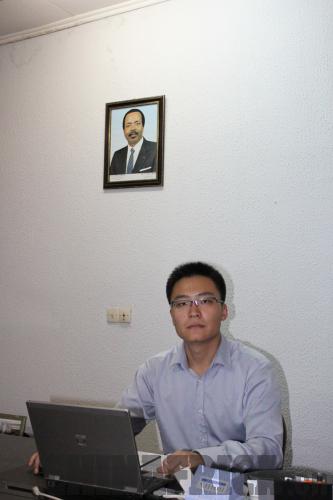|
 |
|
Shi Weiliang (LI ZHIJIAN) |
Localization strategy
If it can be said that the provision of quality service is the key for Huawei to win Cameroonian customers, localization is key for its sustainable development.
In the Huawei Cameroon branch, more than 60 percent of its employees are Cameroonian, and its quit rate is less than 5 percent. The company is continuously expanding its recruitment of locals and goes annually to local universities to recruit graduates.
"To ensure a smooth operation of local networks, key positions in our maintenance service sector are all filled by Cameroonians. Some of our big clients like Orange and MTN are intent on [us] hiring locally, and they want us to also have a stable and localized workforce that is conducive to our long-term cooperation," said Yu Chong, Vice General Manager of Huawei Cameroon. Local staff have the same advancement prospects as Chinese and the Huawei management team has made sure that all are aware that those who are efficient and diligent stand a good chance of promotion, despite their cultural or ethnic background.
Huawei attaches great importance to contributing to the local society in ways other than employing Cameroonians. In 2006, when the company's sales volume was zero, it donated 4,000 books to a foundation for children living with HIV/AIDS. In 2007, it donated 50 computers to a local school, and in 2009, established a primary school in partnership with MTN. This year, Huawei Cameroon has donated $50,000 worth of infant first aid equipment to the Chantal Biya Foundation. In addition to all these, it has frequently sponsored football matches jointly with its business partners.
"We're very optimistic about Cameroon and the whole African continent's development prospects. We aim not only to achieve business success here, but to live up to our social responsibility," Shi said.
Adapting to reality
Shi and his Chinese colleagues live in a five-storey building in Yaoundé, the Cameroonian capital. His wife quit her job in China recently and moved to Cameroon with their two-year-old son. There are many such families like Shi's in the building.
"As far as my Chinese colleagues are concerned, their biggest issue is loneliness. Many are away from their families and friends," said Shi. As public security is an issue, Chinese staff seldom go out at night. They occasionally have dinner at Chinese restaurants with friends.
Shi and his colleagues do play sport. "Because of the hoards of mosquitoes out here, we have to stay fit to guard against malaria," he explained. Their dormitory building has a billiard room and a basketball court, and they also frequent the city's stadium and golf course. Chinese people are often seen jogging in the streets of Yaoundé. Another phenomenon in Cameroon is wherever there are Chinese communities, there are karaoke machines.
Shi admits that doing business in Cameroon is not easy, with complicated approving procedures for investment, inefficient administration, unfavorable financing environment and backward infrastructure. The International Finance Corp. (IFC) and World Bank rank Cameroon as the 168th among 183 countries in terms of ease of doing business. Despite this, in 2010 there were 18 Chinese companies operating in Cameroon, and the trade volume between the two countries was over $1 billion, according to statistics provided by the Chinese embassy in Cameroon.
Shi is confident that there is always a way to overcome any problem in life and in business and says if they can't change the reality in Cameroon, they can adapt to it.
"I believe we can add to our successes. We'll also put more emphasis on localization and train more Cameroonians to be specialists in technology, which will bring benefits to both sides," he said.
(Li Zhijian and Wang Bingyi contributed to the story) |